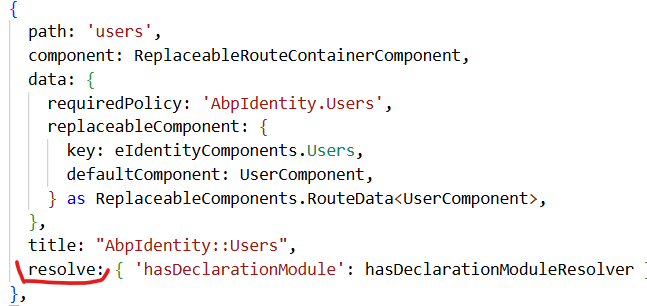Hello, I customize UsersComponent under Administrator -> Identity Management -> Users.
this.replaceableComponents.add({ component: UserComponent, key: eIdentityComponents.Users, });
I need to add resolver like below to routing.
RouterModule.forRoot([ { path: 'detail/:id', component: HeroDetailComponent, resolve: { hero: HeroResolver } } ])
How can I do it? Should I rewrite IdentityRoutingModule? If so, how?
8 Answer(s)
-
0
To add a resolver to the route for a replaced UsersComponent in ABP Angular, you need to override the route configuration for the Identity module. The ABP Angular modules register their own routes, so to customize them (e.g., to add a resolver), you must redefine the relevant route in your application's routing module.
Here’s how you can do it:
- Create Your Resolver
Implement your resolver as a standard Angular service:
import { Injectable } from '@angular/core'; import { Resolve, ActivatedRouteSnapshot } from '@angular/router'; import { Observable } from 'rxjs'; import { UserService } from './user.service';
@Injectable({ providedIn: 'root' }) export class UserResolver implements Resolve
resolve(route: ActivatedRouteSnapshot): Observable<any> { const id = route.paramMap.get('id'); return this.userService.getUserById(id); }}
2. **Override the Route in Your App Routing** In your `app-routing.module.ts`, add a route for the user detail with the resolver: ```typescript import { NgModule } from '@angular/core'; import { RouterModule, Routes } from '@angular/router'; import { UserComponent } from './path-to-your-user-component'; import { UserResolver } from './path-to-your-user-resolver'; const routes: Routes = [ // ...other routes { path: 'identity/users/detail/:id', component: UserComponent, resolve: { user: UserResolver } } ]; @NgModule({ imports: [RouterModule.forRoot(routes)], exports: [RouterModule] }) export class AppRoutingModule {}Disable the Default Route (Optional but Recommended)
If you want to fully control the routing, you may need to prevent the default Identity module routes from being registered. You can do this by not importing theIdentityRoutingModulein your app, or by ensuring your custom route takes precedence.Use the Resolved Data in Your Component
In yourUserComponent, access the resolved data:
import { ActivatedRoute } from '@angular/router';
export class UserComponent { constructor(private route: ActivatedRoute) { this.route.data.subscribe(data => { console.log(data.user); // resolved user data }); } }
**Summary:** You do not need to rewrite the entire `IdentityRoutingModule`. Instead, add your custom route with the resolver in your app's routing module. Angular will use your route when the path matches, and you can use the resolver as needed. Sources: - [ABP Angular Component Replacement](https://abp.io/docs/latest/framework/ui/angular/component-replacement) --- _This response was generated by AI. If it didn’t solve your problem, feel free to post a new answer — our support team will jump in to help you soon._ - Create Your Resolver
-
0
-
0
Hello,
If your goal is simply to display a detail page based on the user ID, there’s no need to override the
IdentityRoutingModule. Instead, you can create aUserResolveras shown below:@Injectable({ providedIn: 'root' }) export class UserResolver implements Resolve<IdentityUserDto> { private userService = inject(IdentityUserService); resolve(route: ActivatedRouteSnapshot): Observable<IdentityUserDto> { const id = route.paramMap.get('id'); if (!id) { throw new Error('User ID is required'); } return this.userService.get(id); } }You can then use this resolver in your routing configuration like so:
const routes: Routes = [ { path: 'identity', children: [ { path: 'users/detail/:id', component: UserDetailComponent, resolve: { user: UserResolver }, }, { path: '', loadChildren: () => import('@volo/abp.ng.identity').then(m => m.IdentityModule.forLazy()), }, ], }, // Alternative approach [#1](https://abp.io/QA/Questions/1): // { // path: 'identity', // loadChildren: () => import('@volo/abp.ng.identity').then(m => m.IdentityModule.forLazy()), // }, // { // path: 'identity/users/detail/:id', // component: UserDetailComponent, // resolve: { user: UserResolver }, // }, // Alternative approach [#2](https://abp.io/QA/Questions/2): // { // path: 'users/:id', // component: UserDetailComponent, // title: 'New Users', // resolve: { user: UserResolver }, // }, ]; @NgModule({ imports: [RouterModule.forRoot(routes)], exports: [RouterModule], }) export class AppRoutingModule {}Feel free to reach out if you need any further clarification or assistance.
-
0
I need a resolver for the identity/user route. I believe I need to override the IdentityRoutingModule.
I found this support question: https://abp.io/support/questions/5639/How-to-change-saastenant-route-in-angular. I tried to apply the same approach, but I couldn't manage to replace the route.
-
0
I see your point now. By this means, you may not even need to replace the
UsersComponentHere is how you could achieve this://my-identity-routing.module.ts import { RouterOutletComponent, authGuard, permissionGuard } from '@abp/ng.core'; import { NgModule } from '@angular/core'; import { Routes, RouterModule } from '@angular/router'; import { identityExtensionsResolver } from '@volo/abp.ng.identity'; import { UserDetailComponent } from './user-detail/user-detail.component'; import { UserResolver } from './my-users/users.resolver'; const routes: Routes = [ { path: '', redirectTo: 'roles', pathMatch: 'full' }, { path: '', component: RouterOutletComponent, canActivate: [authGuard, permissionGuard], resolve: [identityExtensionsResolver], children: [ { path: 'users/:id', component: UserDetailComponent, title: 'AbpIdentity::Users', resolve: { user: UserResolver }, }, ], }, ]; @NgModule({ imports: [RouterModule.forChild(routes)], exports: [RouterModule], }) export class MyIdentityRoutingModule {}//my-identity.module.ts import { IdentityModule } from '@volo/abp.ng.identity'; import { MyIdentityRoutingModule } from './my-identity-routing.module'; import { SharedModule } from './shared/shared.module'; import { NgModule } from '@angular/core'; @NgModule({ declarations: [], imports: [IdentityModule, SharedModule, MyIdentityRoutingModule], exports: [MyIdentityRoutingModule], }) export class MyIdentityModule {}Then in your
app-routing.module.ts{ path: 'identity', loadChildren: () => import('./my-identity.module').then(m => m.MyIdentityModule), }, // { // path: 'identity', // loadChildren: () => import('@volo/abp.ng.identity').then(m => m.IdentityModule.forLazy()), // }, -
0
Thank you for your response. The resolver on 'users/user-detail/:id' works very well, but 'users' does not. I think I need to remove the existing 'users' route, but I haven't been able to manage it.
{ path: 'users', component: ReplaceableRouteContainerComponent, data: { requiredPolicy: 'AbpIdentity.Users', replaceableComponent: { key: eIdentityComponents.Users, defaultComponent: UsersComponent, } as ReplaceableComponents.RouteData<UsersComponent>, }, title: "AbpIdentity::Users", resolve: { 'hasDeclarationModule': hasDeclarationModuleResolver } //Does not work }, { path: 'users/user-detail/:id', component: ReplaceableRouteContainerComponent, data: { requiredPolicy: 'AbpIdentity.Users', replaceableComponent: { key: 'Identity.UserDetailComponent', defaultComponent: UserDetailComponent, } as ReplaceableComponents.RouteData<UserDetailComponent>, }, title: "AbpIdentity::Users", resolve: { 'hasDeclarationModule': hasDeclarationModuleResolver } //Does work }, -
0
This might be due to me unintentionally misleading you about importing
IdentityModuleforMyIdentityModule.If removing that import doesn’t conflict with your requirements, things should work as expected.
//my-identity.module.ts import { MyIdentityRoutingModule } from './my-identity-routing.module'; import { SharedModule } from './shared/shared.module'; import { NgModule } from '@angular/core'; @NgModule({ declarations: [], imports: [SharedModule, MyIdentityRoutingModule], exports: [MyIdentityRoutingModule], }) export class MyIdentityModule {} -
0
Thank you for your response, it works like a charm.
































































